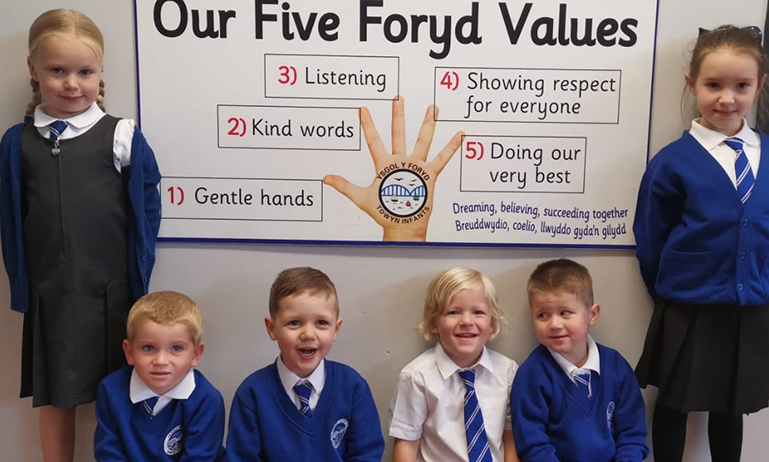Giving pupils the power to learn

Quick links:
Information about the school
Ysgol y Foryd Infant School is in Kinmel Bay within Conwy local authority. The school has 225 pupils between the ages of three and seven, including 50 part-time pupils in the nursery. There are eight classes at the school.
The average proportion of pupils eligible for free school meals over the last three years is around 29%. This is higher than the national average of 19%. A very few pupils are from a minority ethnic background. The school has identified 35% of its pupils as having additional learning needs, which is well above the national average of 21%.
The acting headteacher took up her post in September 2017.
Context and background to the effective or innovative practice
Research shows that effective formative assessment is one of the most important contributors to success in summative assessment. This is because learners have a clear idea of what excellent work looks like and what they need to do to reach this standard. Assessment for learning helps in making understanding and knowledge, as John Hattie describes it, ‘more visible’.
Ysgol y Foryd has researched and trialled many different aspects of assessment for learning strategies and over time has developed a consistent, progressive and innovative approach that works for the school.
Description of nature of strategy or activity
The effective use of assessment for learning strategies supports pupils’ progress and development as independent learners. Based on the work by James Nottingham, all classes devise a learning pit with the pupils at the start of the academic year, as a way of teaching the pupils to face challenges and use mistakes as learning opportunities.
Pupils receive constructive feedback in order for them to understand what they need to do to improve their work. A whole school marking policy that is simple but meaningful to all stakeholders has been the key to getting this right. Pupils understand when they have done something positive and when they can improve on something by looking at the colour of teachers’ marking; pink for positive and green for growth. Opportunity is then given immediately for pupils to improve their work.
All classes use ‘talking partners’ to enable pupils to work in pairs to discuss their learning and share ideas. They are changed regularly to build confidence in speaking and listening. ‘Talk partners’ encourage all pupils to talk and often identify misconceptions early.
The school believes that pupils should be given ‘the power to learn’. All staff decided upon six learning powers and devised character names and stories for each one. The school developed one story at a time, starting with an assembly, followed by activities in each class to promote and reinforce the ‘learning power’. Nearly all pupils refer to the characters when describing how they learned, for example ‘Gwen the gorilla gives it a go!’
Learning at Ysgol y Foryd is topic based and includes skills based focused weeks, including science week, woodland week and beach week. At the start of every topic, teachers find what the pupils already know and the pupils contribute to the planning with ideas of what they would like to learn and how they can achieve this. As the topic progresses, the teachers and pupils complete a learning journey display to demonstrate their new knowledge. Pupil-led planning has resulted in interesting trips and visitors to the school and has increased pupil engagement with their own learning.
What impact has this work had on provision and learners’ standards?
As a result of the assessment for learning strategies being used consistently, pupils are independent in their learning and can identify what they need to do in order to improve their work. They are confident in choosing their own level of challenge. A positive result of the pupils’ ability to reflect on and improve their own learning is, for example, the increase in the number of pupils attaining outcome 6 in personal and social development in the foundation phase.
The whole school ethos has changed as a result of the consistent approach towards assessment for learning. Classes have a ‘growth mindset culture’ and pupils’ ideas and opinions are valued. Learning is built upon and not repeated, which ensures sound progression through the foundation phase. Pupils are given constructive criticism, which enables them to ‘grow their brains’.
How have you shared your good practice?
The school shares its good practice with all stakeholder through meetings, open days, newsletters and Twitter. An effective practice case study has been shared on the consortium’s ‘G6’ platform for schools in the region to read and share.
Ysgol y Foryd are sharing good practice relating to assessment for learning across the consortium. Lead teachers delivered presentations to over 100 schools and the headteacher presented to HLTA’s (higher level teaching assistants) and headteachers as part of the annual HLTA conference.